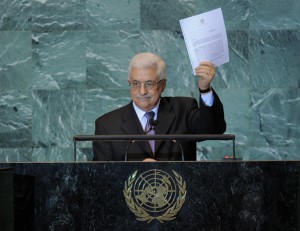The past year in Israel has been anything but boring. The Palestinians were rejected for full-membership in the United Nations, Israeli Corporal Gilad Schalit was returned alive to Israel, Turkey downgraded its diplomatic relations with the Jewish state, the Israeli population took to the streets for social change, and Israel continued its covert operations against Iran’s nuclear program. As is customary for bloggers covering specific regions for the Foreign Policy Association, I will address Israel’s “unexpected event of the year,” name a “man of the year,” and provide a “forecast for 2012.”
Most Unexpected Event: The Return of Gilad Schalit

Gilad Schalit (center) was welcomed home by Defense Minister Ehud Barak (far left), Prime Minister Netanyahu (left) and Head of IDF Lt. General Benny Gantz (right). (Photo: SFGate.com)
There was no bigger surprise inIsrael this year than the return of five-year captive, Corporal Gilad Schalit. On June 26, 2006, Corporal Schalit was captured on the Israeli-Gaza border by Hamas militants. Several proofs of life were provided throughout the duration of his captivity, but in the back of most Israeli’s minds there was the likelihood that Schalit was dead. The odds were against him, as most Israeli soldiers who have been captured by enemy states and non-state actors have either returned in coffins, or not at all. Corporal Gilad Schalit defied the odds. The Israeli population, who intensely lobbied the Israeli government and international community to secure his release, was overwhelmingly satisfied, proud, and inspired by his return. They could be seen on television weeping and praying.
While a joyous occasion, Schalit’s release was surrounded by controversy. There was significant debate about the price Israel had to pay for Schalit, more than 1,000 Palestinian prisoners. Several of the prisoners were directly responsible for the murder of Israelis. A handful of Knesset Ministers and community leaders felt that the prisoners being released would return to terrorism, and would lead future attacks on Israelis. There was also the issue of how Egypt handled Schalit’s return to Israel. Before being allowed to speak with or see his family, Egyptian authorities forced Schalit to do a shameful, and mistranslated, interview on Egyptian national television.
Regardless, the return of Gilad Schalit was a full display of Israel’s value on life, and was a welcomed jolt of optimism to a country that has been experiencing increased international isolation.
Person of the Year: Palestinian Authority President Mahmoud Abbas
Though he is not an Israeli, I could not pass up making Palestinian President Mahmoud Abbas my 2011 “Person of the Year.”
2011 saw the most recent attempt by the Palestinian Authority to gain full-fledged membership in the United Nations. Given its timing in relation to current peace-talks and failed Palestinian unity discussions, it is arguable whether this was in fact in the best interest of the Palestinians. President Abbas did, however, do an admirable job of bringing it global attention. What makes him man of the year is how little he did with that attention.

Palestinian Authority President Mahmoud Abbas addressing the United Nations. (Photo: TheCommentator.com)
In the lead up to the UN General Assembly, there was much speculation about whether membership would actually be granted to the Palestinians. Most understood that for political reasons it would not be. Nonetheless, Israeli Prime Minister Benjamin Netanyahu and US President Barak Obama were noticeably nervous and dismayed. They made significant attempts to change President Abbas’ mind and lure him back to the negotiating table for direct talks with Israel. President Abbas found himself in a unique, and rare, position of power and control. It would have been more than possible to make reasonable demands of Israel and the US in order to get peace talks back on track. It could have been a turning point in discussions, bringing some long lost muscle and credibility back to Palestinian leadership. Instead, President Abbas chose to pursue full-membership to the UN. As expected, his application was rejected and his reputation spoiled.
Since his failure at the UN, President Abbas has been mostly stagnant and the Palestinian resolve has further eroded. In the last two-weeks he has openly stated that he is considering Hamas membership in to the Palestinian Liberation Organization. This would likely halt all discussions of peace and lead to a Hamasization of the West Bank.
Forecast for 2012
Given the events of 2011, the upcoming year will likely be a pivotal one for the Jewish state. There are lots of unanswered questions: what is the future of Israeli-Turkish relations? Will the social protests actually lead to change? What is the future of the Palestinian Authority in the West Bank? What will the elections in Egypt mean for the Egyptian-Israeli peace treaty? And of course, what is going to happen with Iran?
It would be nice if one could be optimistic about the answers to the above questions, but it is unfortunately difficult. Israeli-Turkish relations are likely to break off completely barring a change of heart in Turkish regional ambition. Given the gridlock system of the Israeli government it is unlikely any kind of social change will happen in the near future. If Hamas is allowed in the Palestinian Liberation Organization the West Bank will likely turn in to Gaza 2, with peace-talks hitting an all-time low. The Muslim Brotherhood, the likely future ruling party of Egypt, is preaching moderation and peace with Israel, but political pundits believe otherwise. It will not be the first time politicians have lied about alliances in order to gain international support. The only place one can find any remote sense of optimism/neutrality in predicting Israel’s 2012 is that it will certainly keep up its covert operations against Iran’s nuclear program.
The truth is that Israel is one of the most dynamic and unpredictable countries in the world. On any given day, anything can happen. The only thing that is certain is that Israel will continue its economic development and that its people will do their best to live happy and normal lives.